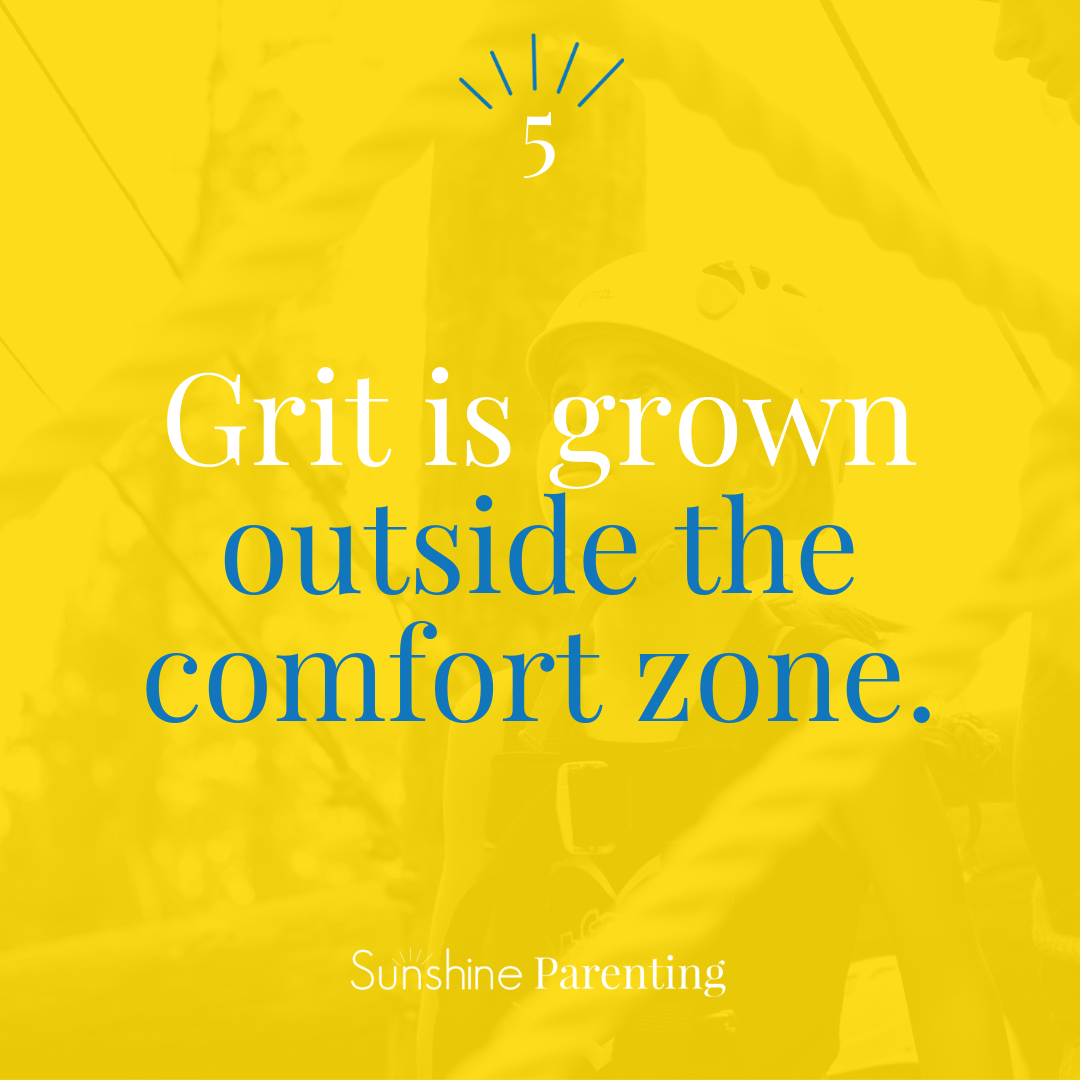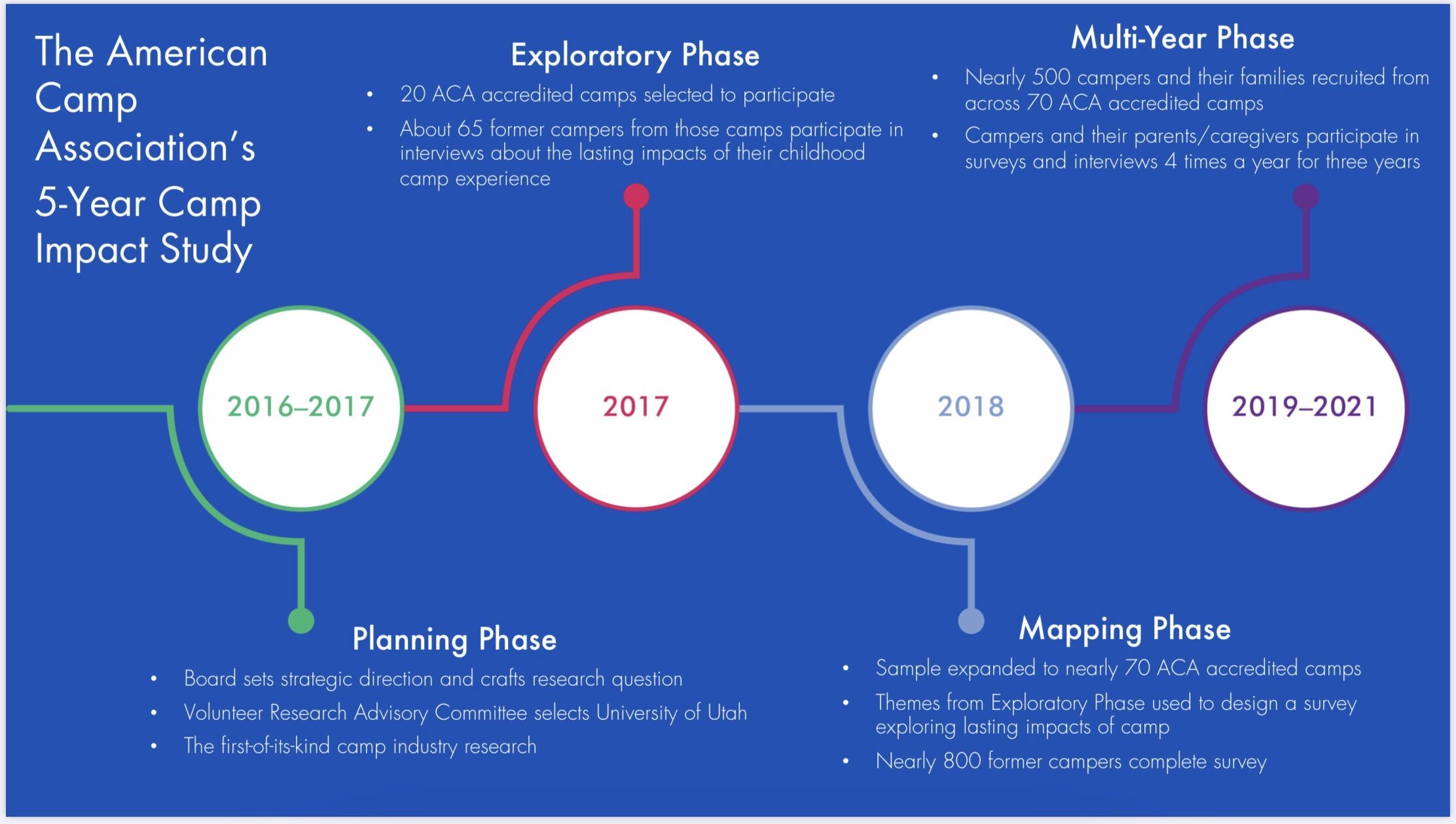January Parent Coffee

Want to bring some of the fun, connection, and character and skills growth of GAC home to your family this year? Grab your coffee or tea, login, and join other GAC parents for our first parent coffee of 2024! We’ll learn about and discuss simple, research-based and experience-backed strategies covered in HAPPY CAMPERS for bringing some camp strategies home to your family.
Get your copy of Happy Campers!
Audible
Kindle/Print
Audrey “Sunshine” Monke, who will be speaking at this coffee, is Gold Arrow Camp’s Chief Visionary Officer, the author of Happy Campers: 9 Summer Camp Secrets for Raising Kids Who Become Thriving Adults, and the host of the Sunshine Parenting Podcast. Audrey regularly speaks to parents and teachers on the topics of friendship skills, connection, and well-being. See some of her past interviews and events here.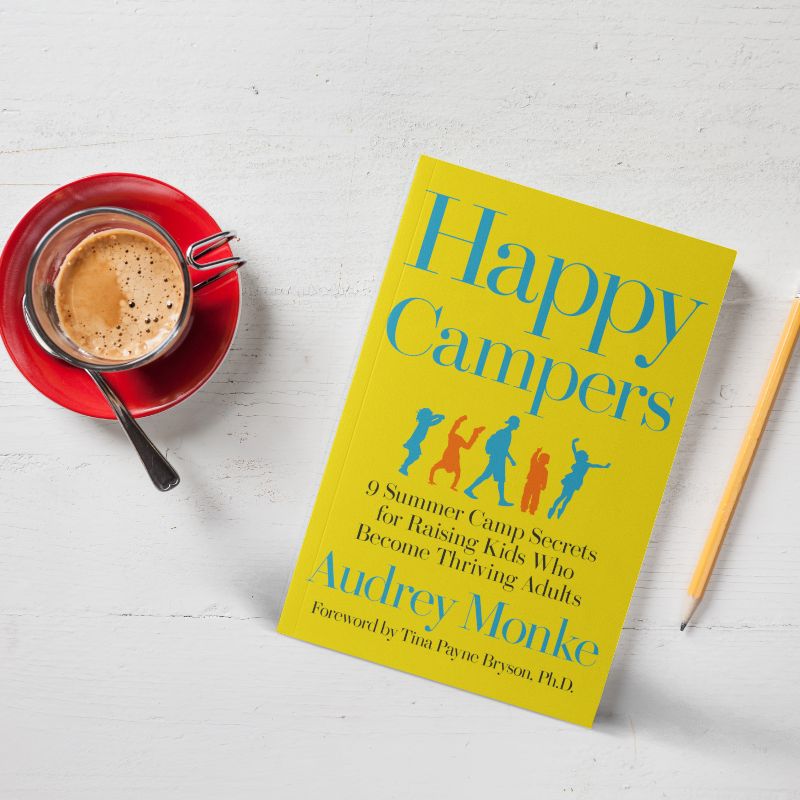
National Day of Unplugging
Want to bring some of the fun, connection, and character and skills growth of GAC home to your family this year? Grab your coffee or tea, login, and join other GAC parents for our first parent coffee of 2024! We’ll learn about and discuss simple, research-based and experience-backed strategies covered in HAPPY CAMPERS for bringing some camp strategies home to your family.
Get your copy of Happy Campers!
Audible
Kindle/Print
Audrey “Sunshine” Monke, who will be speaking at this coffee, is Gold Arrow Camp’s Chief Visionary Officer, the author of Happy Campers: 9 Summer Camp Secrets for Raising Kids Who Become Thriving Adults, and the host of the Sunshine Parenting Podcast. Audrey regularly speaks to parents and teachers on the topics of friendship skills, connection, and well-being. See some of her past interviews and events here.
We invite all of our friends and family to join Gold Arrow Camp in participating in the National Day of Unplugging from sundown on March 3 to sundown on March 4. This time of being unplugged is a movement to encourage people to get a “24-hour respite from technology.” If you have experienced a summer at GAC then you know the importance of unplugging and connecting face-to-face, which is why we don’t allow cell phones at camp.
The National Day of Unplugging encourages people to use 24 hours free from technology to connect with “ourselves, our loved ones, and our communities.” Wow. That sounds an awful lot like camp! We love the idea of unplugging (just for a little bit) at home so that we can reforge the kind of connections there that we forge at camp, where we’re totally free from the burden of technology.
You can join us in celebrating by pledging to #unplug on social media, sharing this news story, or even planning an unplugged event with your family! You could have an old-fashioned dinner party, spend that Saturday working on puzzles or playing board games. If you need more ideas, check out the NDU 2023 Ideas List and sign up to become a FREE member!
If you have plans to unplug, please tag us in those on your social media. We’d love to share your plans (and what you did, after the fact, of course) on our social media!
Have Fun: Creating a Positive, Connected Family Culture – Parent Coffee on January 19

Want to bring some of the fun and connection of GAC home to your family this year?
Creating a close and connected family culture that promotes positive, lifelong relationships is the most important thing we can do for our children. Grab your coffee or tea, login, and join other GAC parents for our first parent coffee of 2022. We’ll learn about and discuss simple, research-based and experience-backed strategies for adding more fun and connection at home.
Audrey “Sunshine” Monke, who will be speaking at this coffee, is Gold Arrow Camp’s Chief Visionary Officer, the author of Happy Campers: 9 Summer Camp Secrets for Raising Kids Who Become Thriving Adults, and the host of the Sunshine Parenting Podcast. Audrey regularly speaks to parents and teachers on the topics of friendship skills, connection, and well-being. See some of her past interviews and events here.
All Gold Arrow Camp parents who register will be entered in our drawing for one of 10 free, signed copies of Happy Campers. Drawing will take place and winners will be notified on January 14, 2022.
Registrants will be sent a recording after the meeting as well as a PDF with the strategies and links we discuss.
Resources & Links
Happy Campers: 9 Summer Camp Secrets for Raising Kids Who Become Thriving Adults
Connection Comes First: Free Resources & Parent Coffee Chat
At GAC, we believe that connecting with our kids and forming close, positive relationships with them is the most important responsibility of being a parent (or camp counselor!).
Opportunities to learn more about connecting with your kids
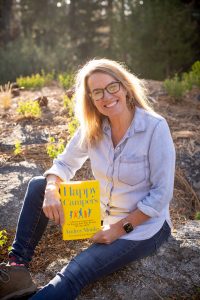 Connection Tips & Resources
Connection Tips & Resources
Our Chief Visionary Officer, Audrey “Sunshine” Monke (host of the Sunshine Parenting Podcast and author of Happy Campers: 9 Summer Camp Secrets for Raising Kids Who Become Thriving Adults) is sharing connection tips with parents who sign up for her email series: Connection Comes First. As soon as you sign up, you’ll immediately get access to a free audio or print download of the first chapter of Sunshine’s book: Camp Secret #1: Connection Comes First.
Sign up for Sunshine’s connection tips (and the free book chapter) here.
Connection Coffee Chat
Join with other GAC community members (staff & parents) to chat about the important topic of connecting with our kids! We’ll share tips and resources AND get the chance to connect with one another.
When: Sep 29, 2021 08:30 AM Pacific Time (US and Canada)
Register for the 9/29/21 parent coffee chat by clicking this link.
After registering, you will receive a confirmation email containing information about joining the meeting.
Grit is Grown Outside the Comfort Zone
Listen to Sunshine Parenting Ep. 85: Grit is Grown Outside the Comfort Zone:
Episode 85 of the Sunshine Parenting Podcast, was recorded live at Pegasus School in Huntington Beach as part of their PEGtalks Parent Education Series. I’m with my frequent guest, Sara Kuljis, the owner and director of Yosemite Sierra Summer Camp and Emerald Cove Day Camp. We talk about my book, Happy Campers and discuss Camp Secret #5, Grit Is Grown Outside the Comfort Zone.
Read more in 5 Ways Camp Grows Grit.
BIG IDEAS
- Kids tend to be more courageous and try more things when their parents are not around.
- It’s important for parents to learn how to help their kids to become resilient human beings and take risks even when they’re near us.
- It’s really important for kids to grow their grit-muscle.
- Parents need to fight the tendency to overprotect their kids because too much protection makes kids fragile.
- When parents jump in to rescue their kids it doesn’t usually work out too well.
- Kids need to see their parents as real, authentic people. This reassures them.
QUOTES
Sara: “This book is just packed full with so many awesome parenting tools drawn from the camp environment.”
Audrey: “I found myself talking to camp parents a lot more about things that were going on with their kids at home, about things that we do at camp that they could try to make their kids feel better and happier at home.”
Audrey: “I also found that a lot of the training we did with our counselors, about just basic positive behavior management techniques, friendship skills, was really applicable to parents.”
Audrey: “We believe in summer camp for kids, but even more so, I believe in the great experience it is for camp counselors. The experiences of having to lead a group, manage kids, learn how to speak and lead positively, learn how to manage conflicts, clean up throw up–these are skills that are really beneficial when you do become a parent at some point later in life.”
Audrey: “Kids tend to be more courageous and try more new things when parents aren’t sitting right there. We are really fortunate to see a ton of growth in this area at camp because we get to have these kids in this environment where they are suddenly feeling like, ‘OK maybe I can try this’.”
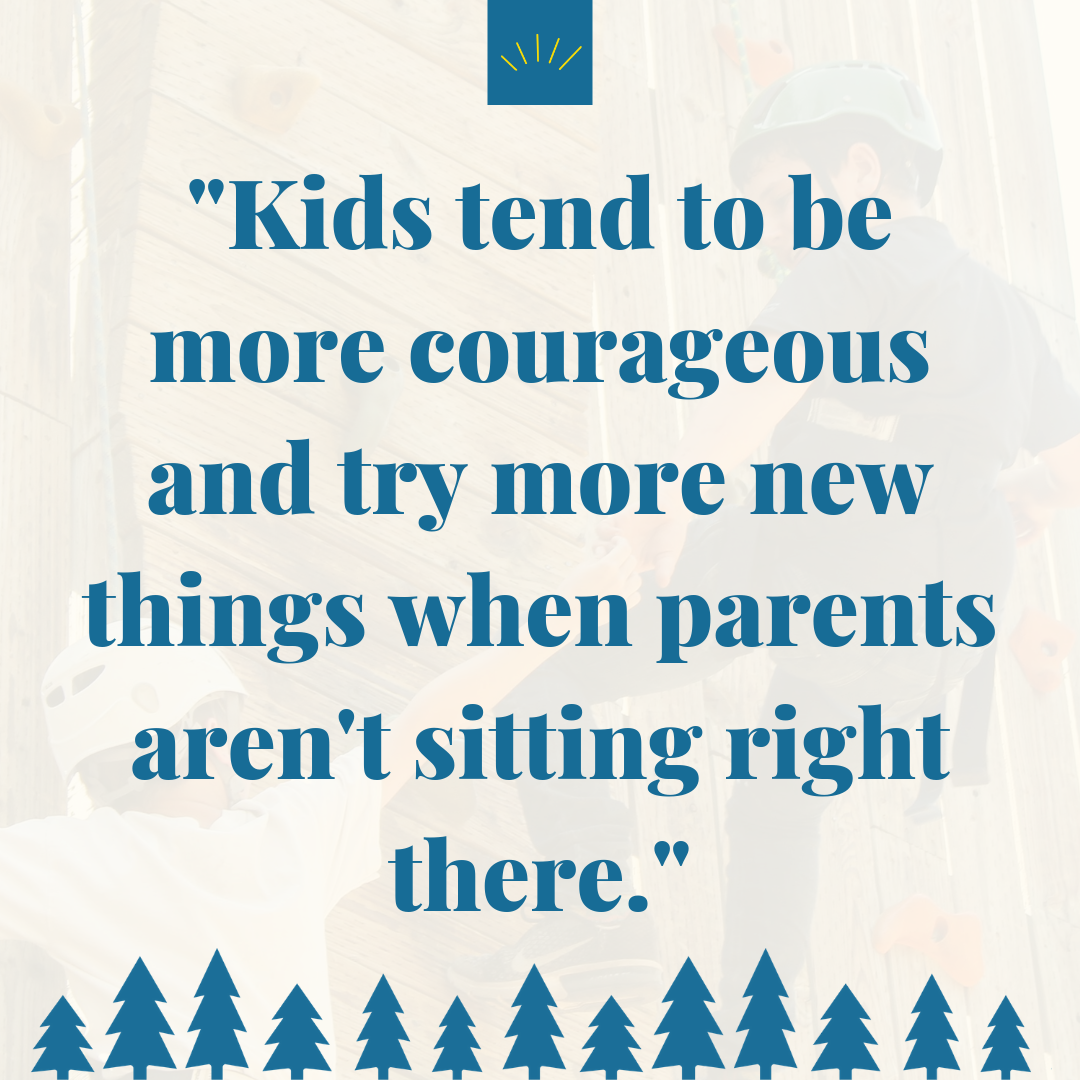
Audrey: “We must learn how to help them become resilient human beings, even when they’re near us. We’re seeing a lot of the results of kids who aren’t growing that kind of resilience. It comes out when they’re teenagers or young adults as serious mental health issues because they don’t feel that they have the capacity to bounce back from the normal setbacks and problems of life.”
Sara: “Think of grit as a muscle. You don’t start lifting 400 lbs at the gym; you start small. Little by little, you bump up that weight on the bench press. It’s fun to think of ways that even our little humans can start to grow their grit muscles. When, in time, you’re sending that big human off to college, hopefully, they have grown some good muscle. That freshmen year isn’t so overwhelming because they have practiced folding their clothes and doing their laundry. They have gone to talk to their teacher and can advocate for themselves. They have had to suffer through a disappointing grade. They can make new friends and say ‘I’m sorry’ to a friend. All those little grit-muscle growth opportunities are essential.”
Audrey: “I first heard the term ‘grit’ in Paul Tough’s How Children Succeed. In their research, the trait that they found that was most predictive of successfully completing college was grit or resilience. It’s a really important trait in all areas of life.”
Audrey: “As a parent, it’s our natural inclination to want to protect (our children) their whole life. If we keep protecting them too long and too much, we end up making them fragile. You have to be blown around and have some hardships to get strong. If you keep your child too protected from any kind of physical, emotional, or social pain for too long they can be blown over by little things.”
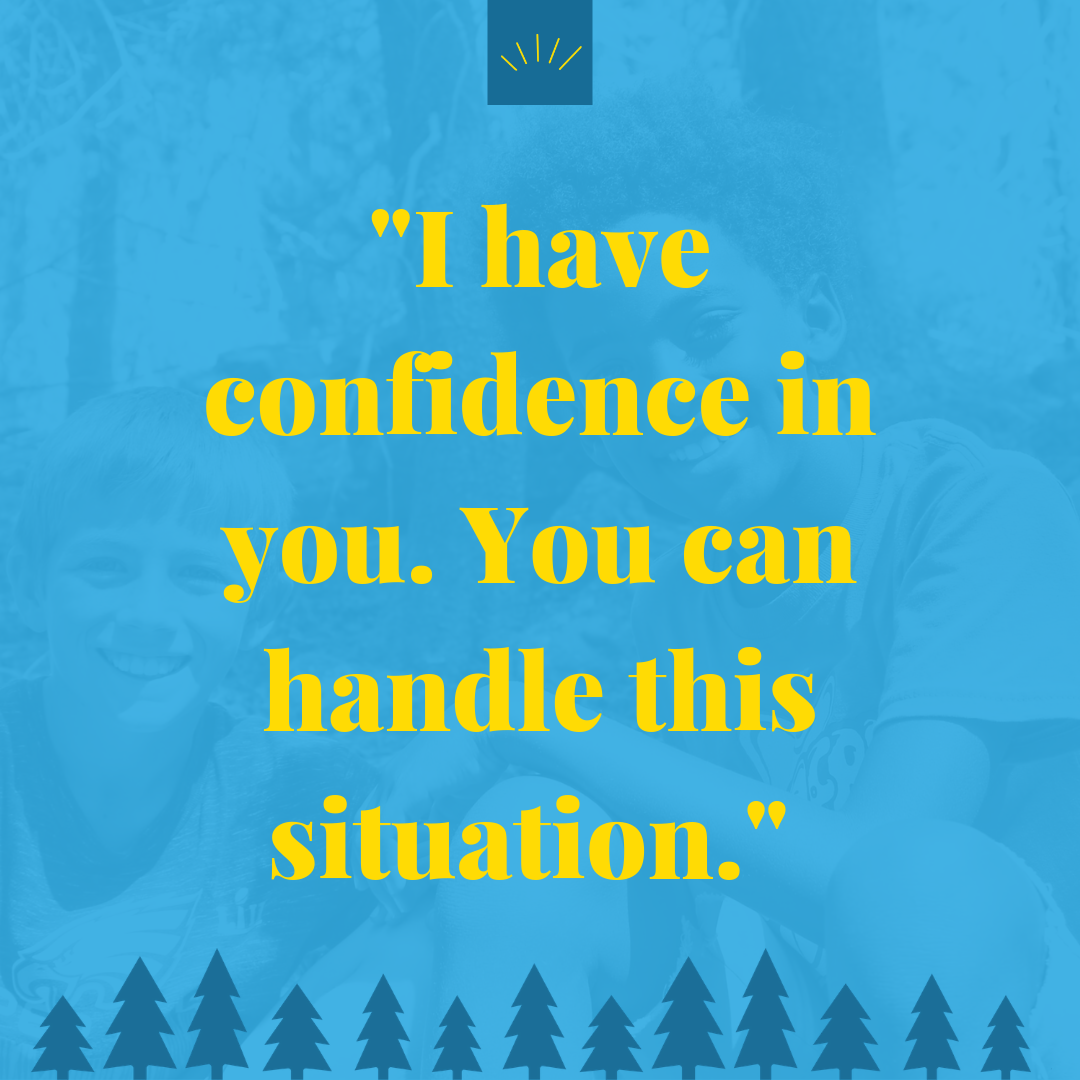
Audrey: “Think about what you used to do at different ages. That should really give you the confidence to know that your kids can probably be doing more than what you think they can right now.”
Sara: “When your kids are small you’re a caretaker. But then you transition into being their coach. And ultimately, you transition into being their consultant.”
Audrey: “It’s very tempting when something goes wrong to want to fight our kids’ battles. Instead, turn it around so they’re not a victim. Explain that it’s not all about them but it’s the other person’s bad behavior. Tell your kids, ‘I know you can handle this’ because–as we all know–when mom or dad does step in or talks to the teacher, it doesn’t usually work out very well.”
Audrey: “It’s never as clear as it looks. We all have our moments and all of our kids have the capacity when their feelings are hurt, or when they feel left out, to say something or do something that’s not kind.”
Audrey: “We can do so much for our kids, and build their social resilience and grit, by letting them know that it is normal to have people do rude things. It happens every day in life. If your kids are really young, you can empower them and give them the confidence that they have strategies to deal with it. That’s the kind of resilience you want your kids to have.”
Sara: “We often ask, ‘What do you think is the other side of the story?’ Just building that bit of empathy for the other side is so helpful. When we don’t crumble when our kids go through hard things and when we don’t panic and rush to rescue them, it teaches our kids that they can handle it too. They see us modeling our confidence and peace, trust in each other and in good decisions. Borrowing courage until you have your own is a pretty groovy tool to have. Sometimes as parents we have to reach out to friends and peers and borrow courage, as well. We are all human and need to help each other raise our kids.”
Audrey: “Remember stories from childhood and share them with your kids, especially the struggles you experienced. They need to see us as authentic, real people who had these same kinds of things happen to us because it’s really reassuring to them.”
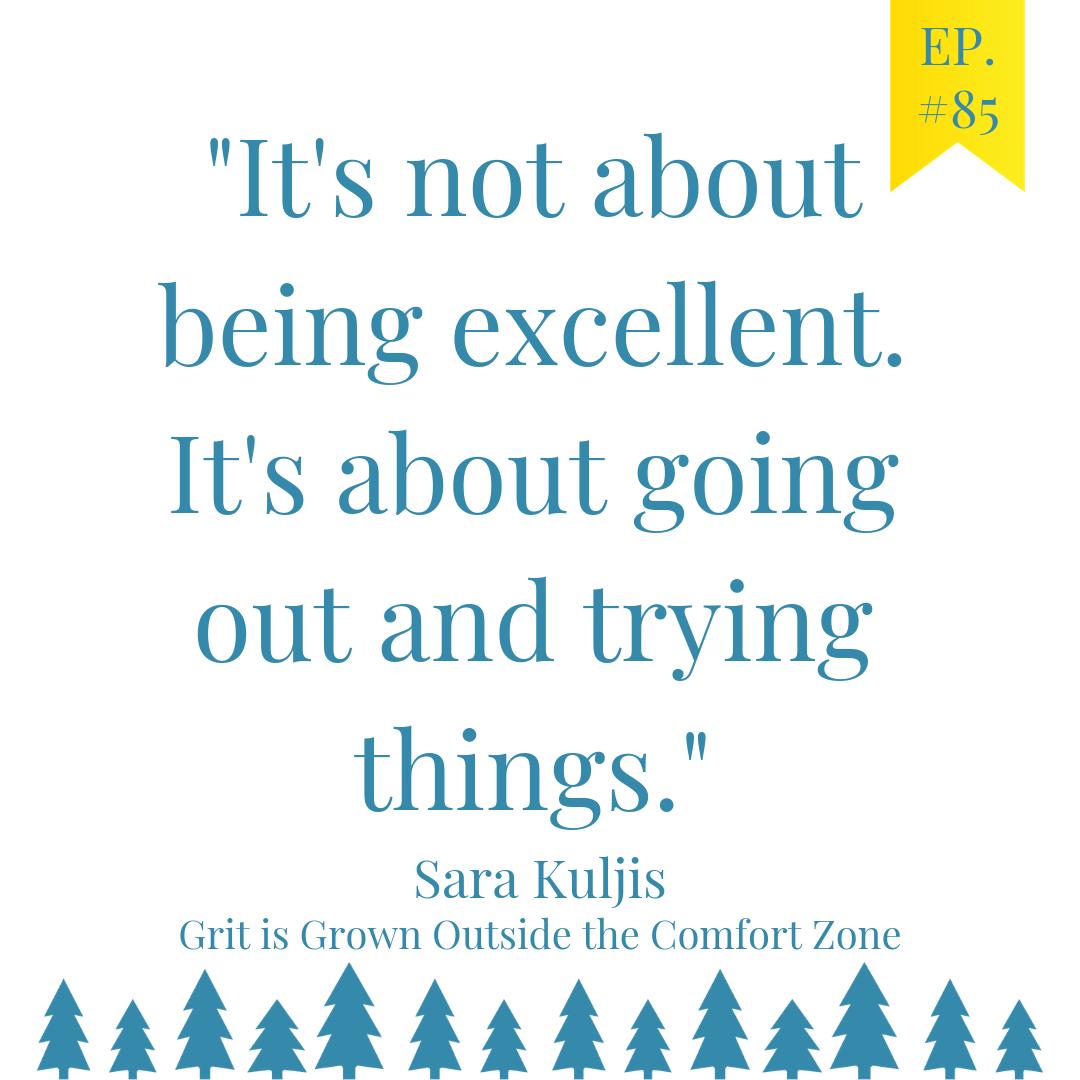
Audrey: “You grow grit from trying new things. There’s this model to teaching: first you do it for them, then, second, you do it with them. Then, you’re watching them and helping them do it, and then, finally, they’re doing it independently. You can think about that with anything from driving, to social stuff, to new sports that you’re teaching, riding a bike. That is how you help them to learn new things with your support.”
Audrey: “At camp we have to make everything fun, even putting sunscreen on. We’ve mastered the art of making mundane things fun. When you make mundane things fun at home, that just creates a really fun culture.”
Audrey: “Setting goals is a great grit-building idea. It’s something you can do as a family. You can all set a goal of something you want to try. Model for your child that you’re setting a goal and working towards it. My kids have learned much more from watching me do things than from me telling them to do something.”
Audrey: “I like the idea of a courage box where each person tries something they’re afraid of, or something new–it can be anything–but each person sets a goal to overcome that fear, of pushing their comfort zone. The idea is celebrating courage with your kids.”
Sara: “Take the heat out of having to be an expert the first time you try something. We don’t try a new sport to be on varsity or to be the best. Sometimes we try it because it’s fun, or we’re curious or just to try something new. We need to take away the pressure to excel that is so prevalent in our culture. It keeps kids from trying things. It is not about being excellent; It’s about going out and trying.”
Audrey: “Leadership, parenting, it’s all the same.”
The Positive Impact of Camp Experiences: American Camp Association Research
Listen to Episode 87 of the Sunshine Parenting Podcast: The Impact of Camp Experiences with Dr. Laurie Brown.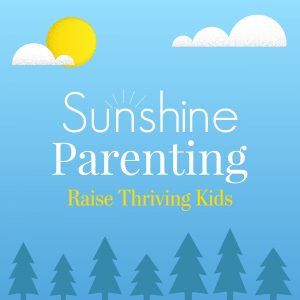
In this episode of the Sunshine Parenting Podcast, I interview Dr. Laurie Browne, Director of Research for the American Camp Association, about the five-year camp impact study being done by an external research team through the University of Utah. The study explores the lasting impacts and the ways camp experiences prepare young people for college, their careers, and their lives beyond camp.
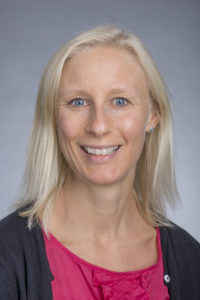
I hope you enjoy this conversation with Laurie and learn more about the incredible research that’s finding that camp truly does have an amazingly positive impact on the development of young people.
BIG IDEAS
- The ACA wants to make sure that camps thrive into the next century and that they serving more campers and in better ways.
- The heart of this five-year study consists of three major components: the youth, the staff, and leadership development. Its objective is to determine the lasting impacts of camp and the interplay between camp, school, home, and future jobs. Through this study of over 500 families, they will identify camp’s role in the “learning landscape”.
- The data collection and analysis is being done by an independent research institution outside of the ACA through the University of Utah.
- We discuss:
- the outcomes and benefits for parents who prioritize camp.
- the importance of having other adults to mentor our children, especially the positive influence of camp counselors.
- what families and schools can learn from camp
- having campers reflect on what they learned at camp so they can apply it to real life situations.
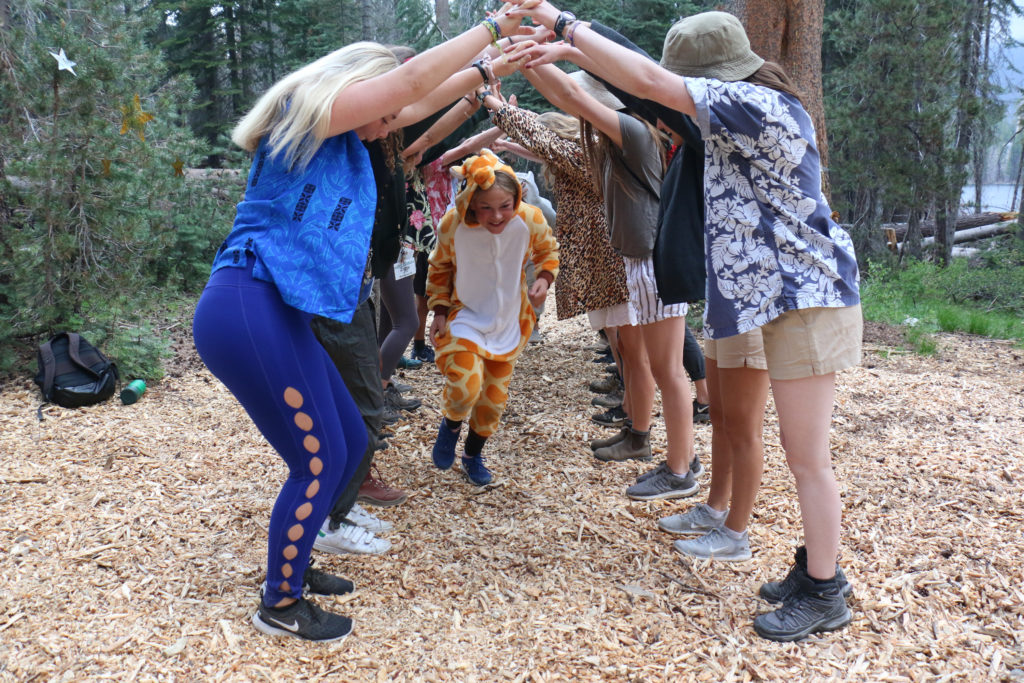
QUOTES
LAURIE: “This is a multi-layered study which builds off itself, starting with qualitative approaches, interviews, and surveys. Then the findings were quantified and a longitudinal study was designed which is tracking campers and their families over time.”
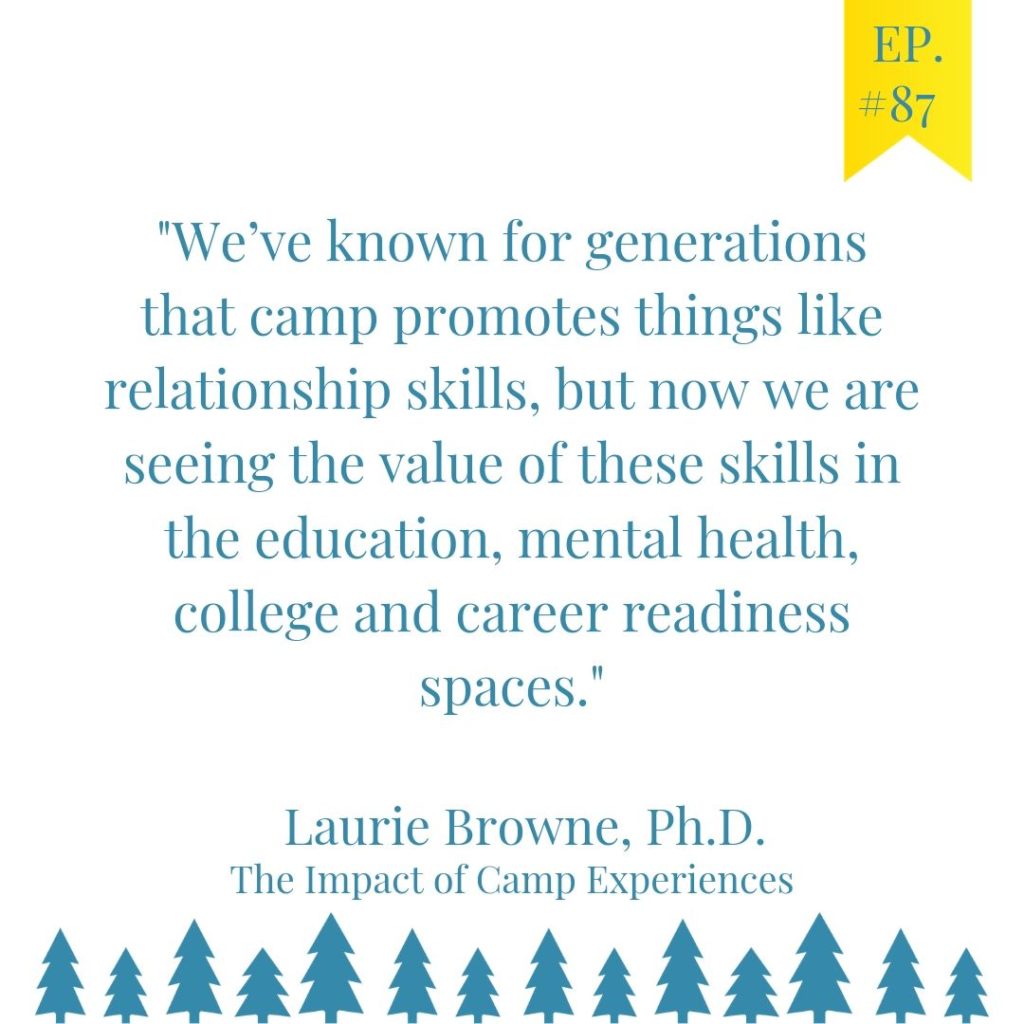
LAURIE: “We’ve known for generations that camp does great things for kids. But I think the environment is far more ready for the type of social, emotional learning related outcomes that camp provides. We’ve known for a hundred years that camp promotes things like relationship skills, but only now we are seeing in the education, mental health, college and career readiness spaces, the value of relationship skills. We have employers saying that is the number one skill they expect in college graduates. That is harder and harder to find.”
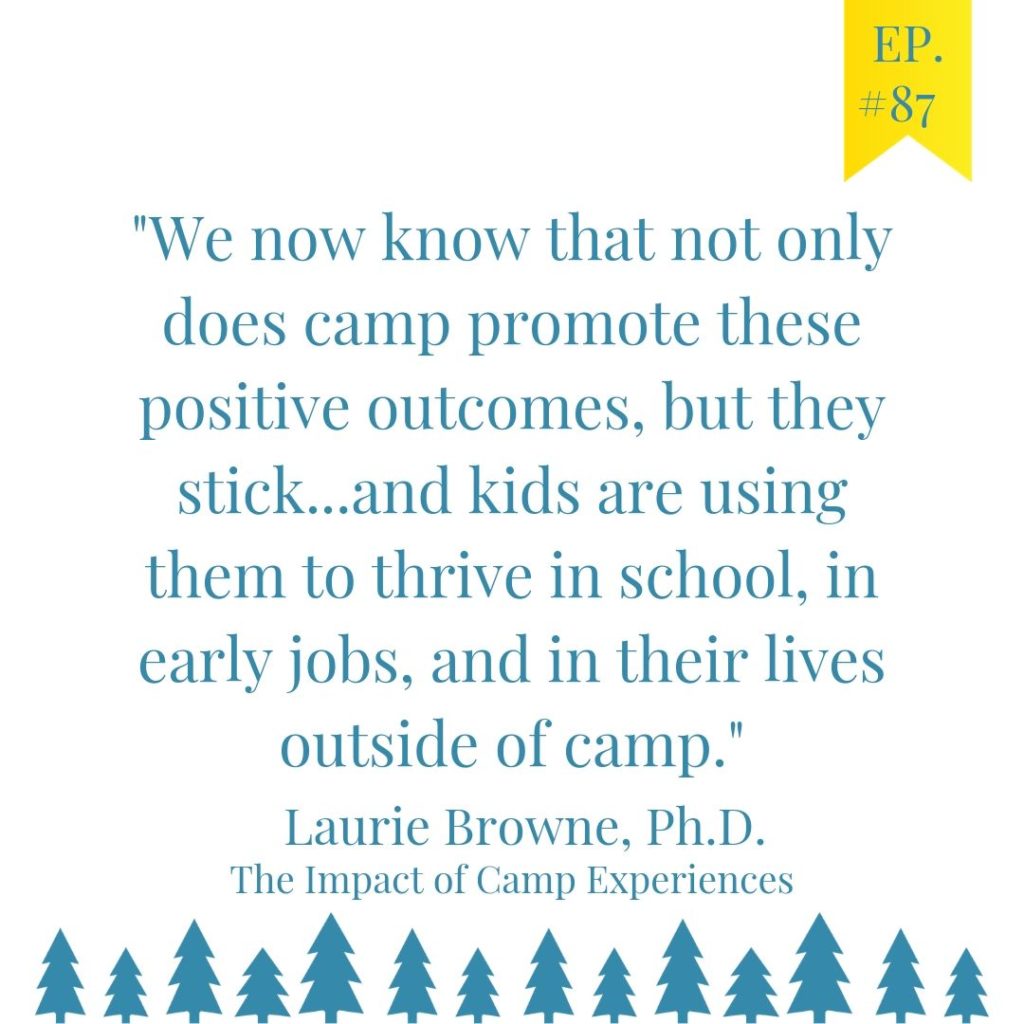
AUDREY: “Other places (school, sports) have another focus that is their most important priority (academics, sports skills) but at camp, our number one focus is on the community building, the cultural building, and training our counselors to facilitate friendships and relationships among campers.”
LAURIE: “It all layers on top of one another, the interplay between camp and school and home. All the spaces work together to create a thriving, successful child. And now we know that camp plays a very unique—even critical—role in that overall landscape.”
LAURIE: We’re interested in the family dynamic around camp. How do families choose to go to camp? How do they integrate camp with the other things in their lives? (In this study) parents are emerging as beneficiaries and have their own outcomes relating to camp. We’re specifically having parents share with us the value and benefits to them of sending their kids to camp, day camp and overnight camp. Parents are recognizing that kids come home and in many cases, are more active citizens in the family. So it improves family processes when they send their kids to camp. But specifically, in overnight camp experiences, parents are saying, ‘I’m a better parent. I get some time to connect with my partner, to engage in some of the things I don’t always get to do when I am busy caretaking.’ Then when the kids come back, they are really happy so as a family unit, it brings all kinds of benefits to parents as well.”
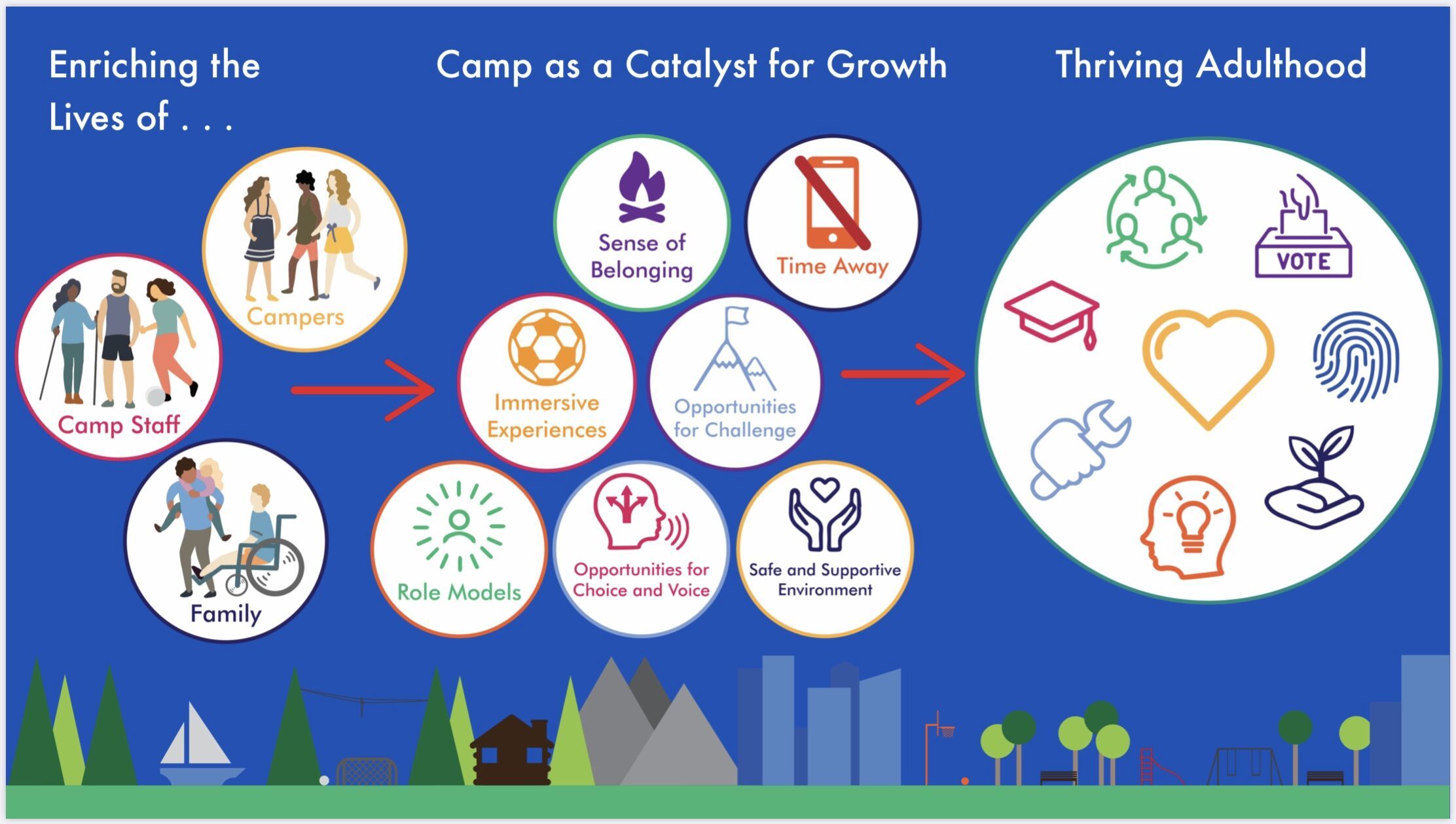
AUDREY: “I’ve heard from many parents that it’s almost a relief to know their children are being taken care of. They can relax. They don’t need to be monitoring, following, texting. It’s a much-needed break for parents who feel so much pressure to be so involved with everything. For so many parents who are working and taking care of kids, their lives are so full that what often gets neglected is their own well-being and what brings them happiness.”
AUDREY: “I tell parents to use the time when their kids are at camp to have their own ‘camp’ type of well-being experience: be with your spouse, your friends, do hobbies that you don’t normally have time to do, so that when your kids come home and have all these great things to share about what they’ve done, you can share, too.”
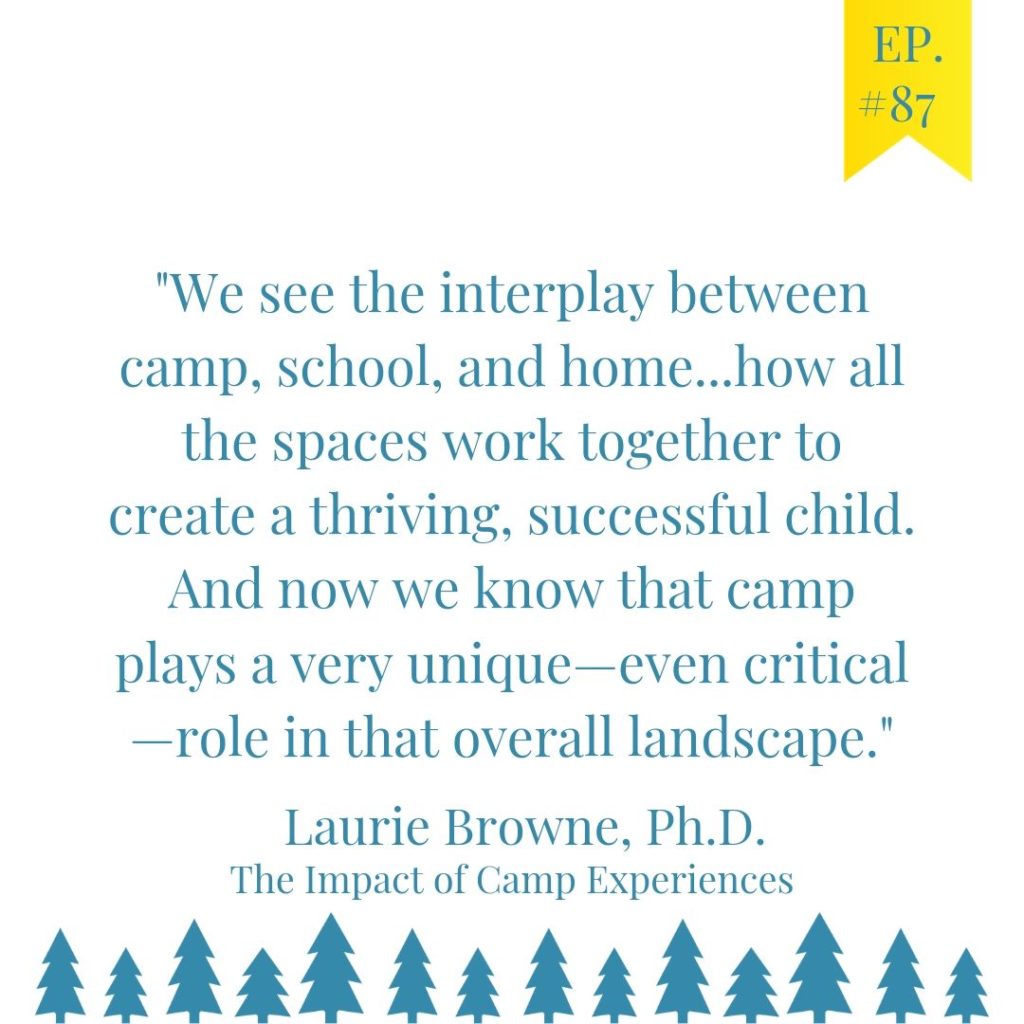
LAURIE: “We have to cultivate happiness by doing things other than work and caregiving. It’s an investment in our own well-being and we are better parents when we make that investment. I think as mothers we feel really inclined to set aside our well-being for our kids. But now there’s so much dialogue around the importance of our time away from kids and to know that your child is thriving because they’re apart from you, is literally one of the findings we are seeing.”
LAURIE: “The opportunity for kids to practice a sense of independence and from that, they can develop a true sense of responsibility and not just that they do their chores but they see themselves as a responsible contributor to their family, to their community and they get to practice that at camp. There are benefits to campers and parents.”
AUDREY: “Even if you don’t send your kids to camp ever, it’s important to find other adults who can mentor your kids because there are some things that your kids either won’t do with you there or will be more tentative about trying. It’s okay for parents to know that you’re not supposed to be able to teach your child everything. That’s why you have teachers at school, sports coaches, camp counselors…So much of who my kids are is because of these amazing role models. How fun for them to get to learn from and interact with other adults. That’s the other lesson that camp can provide for parents: You don’t have to feel like you’re alone in this.”
LAURIE: “Camp counselors are simply younger and more relatable than a lot of the adults that kids encounter in other spaces of their lives. That closeness in age is a really critical opportunity not just for mentorship but for kids to see themselves as an emerging adult. Camp counselors seem attainable. Our staff members are the ones that are really modeling these outcomes, facilitating opportunities to learn and helping those outcomes to stick over time.”
AUDREY: “I think parents looking at camps need to know that you don’t need a fancy facility or fancy equipment. It really is all about the camp counselors—how they treat kids and how focused they are on the kids as their top priority.”
LAURIE: “A culture of caring, a culture of inclusiveness, a culture of belonging is created by all the people combined. We have staff, and then we have campers, but you put all of them together with the traditions and the norms of camp and that creates a culture that in and of itself is so powerful as a mechanism for lasting learning. It’s about intentional culture building around care, safety, and inclusiveness—it’s really what matters.
LAURIE: “What a great opportunity to practice being a member of a community that isn’t their family—especially in adolescence. As kids grow up, they have to be able to see themselves in worlds outside of their homes. That’s a critical part of their developmental process.”
LAURIE: “Kids are making connections between camp and home and school. What a great opportunity for parents, educators and camp professionals to help bring more visibility to those linkages. Help campers identify the connections between them.”
AUDREY: “We have kids reflect before they leave camp about what they’re going to bring home with them. We ask them, ‘what have you learned here that you’re going to use in your life’ and it’s amazing to hear them articulate what they’re going to take back. They learn these great things but they need to take the time to figure out how they’re going to translate this to the rest of their life, the other weeks of the year beyond camp.”
LAURIE: “Research is exciting, but it really doesn’t matter near as much as what really amazing camp professionals are doing with campers and staff. That’s where the magic happens.”
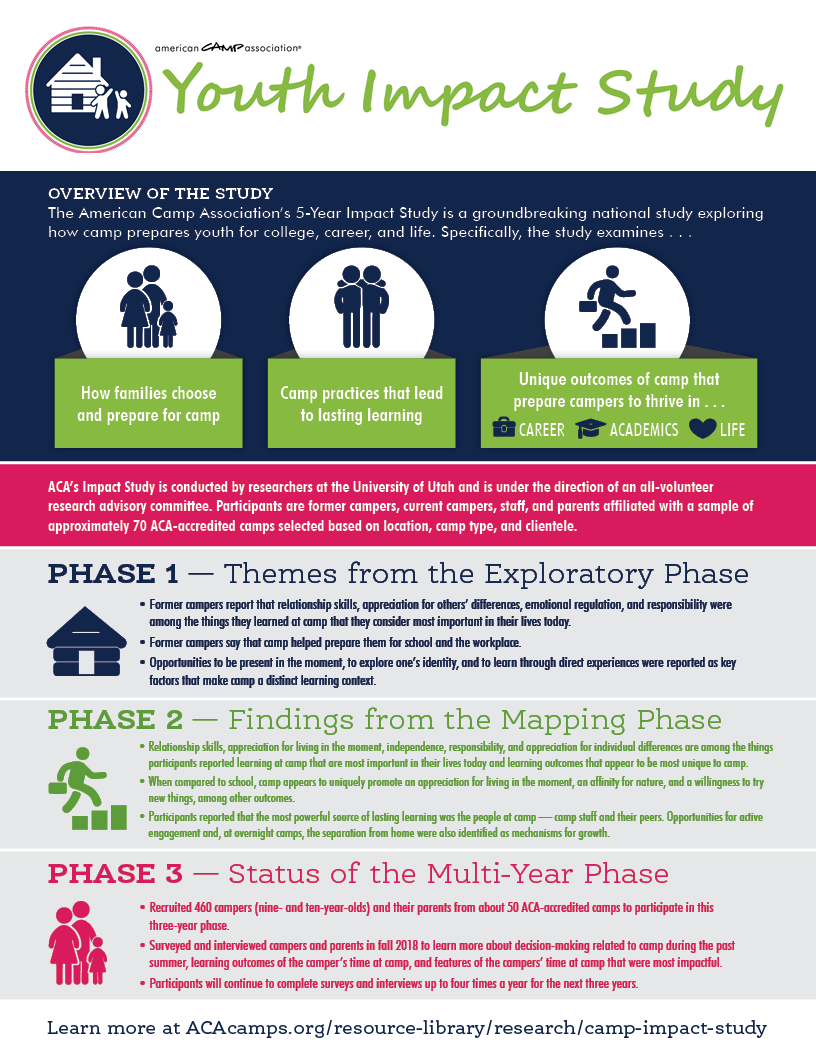
LINKS
Susan Pinker– The Village Effect Ted Talk
RELATED POSTS/PODCASTS
Research finds Children Learn Social Skills at Camp
Ep. 32: 10 Benefits of Summer Camp for Teens
Podcast originally published at Sunshine Parenting.
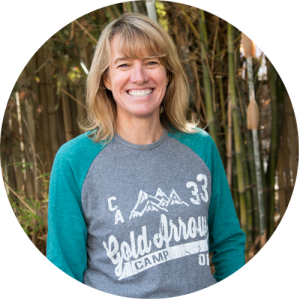
Audrey “Sunshine” Monke, MA, has been the owner of Gold Arrow Camp since 1989 and currently serves as the Chief Visionary Officer. In addition to her vision-casting and mentoring at GAC, Sunshine is an author (Happy Campers: 9 Summer Camp Secrets for Raising Kids Who Become Thriving Adults), podcast host, speaker and coach on the topics of parenting, social skills, and happiness. Find out more at her website, Sunshine Parenting.
Visit Sunshine Parenting for more summer camp-related posts & podcast episodes.
One Word
For each of us, 2020 held a lot of different moments and emotions. We have now entered 2021, which is a great time to sit back and reflect on all that was last year. Audrey “Sunshine” Monke, GAC’s Chief Visionary Officer, shares with us an activity that your entire family can do together that encourages everyone to choose one word that will help to provide guidance, inspiration, and direction for the year.
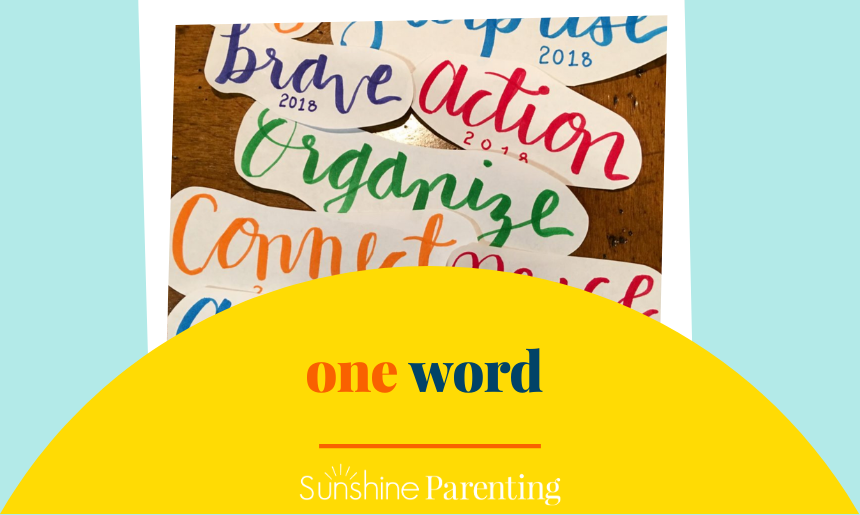
On her website (Sunshine Parenting) and her podcast, Sunshine shares many resources to encourage family time and reflection, among many other useful topics for parents. To access those resources, sign up to receive her weekly emails or subscribe to her podcast.

